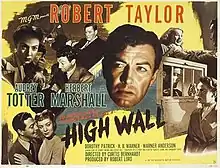High Wall
High Wall is a 1947 film noir, starring Robert Taylor, Audrey Totter and Herbert Marshall. It was directed by Curtis Bernhardt from a screenplay by Sydney Boehm and Lester Cole, based on a play by Alan R. Clark and Bradbury Foote.[2]
| High Wall | |
|---|---|
 Theatrical release poster | |
| Directed by | Curtis Bernhardt |
| Produced by | Robert Lord |
| Screenplay by | Sydney Boehm Lester Cole |
| Story by | Alan R. Clark Bradbury Foote |
| Based on | the play by Alan R. Clark Bradbury Foote |
| Starring | Robert Taylor Audrey Totter Herbert Marshall |
| Music by | Bronislau Kaper |
| Cinematography | Paul Vogel |
| Edited by | Conrad A. Nervig |
| Distributed by | Metro-Goldwyn-Mayer |
Release date |
|
Running time | 100 minutes |
| Country | United States |
| Language | English |
| Budget | $1,844,000[1] |
| Box office | $2,618,000[1] |
Plot
Steven Kenet catches his unfaithful wife Helen in the apartment of Willard I. Whitcombe, her boss, and she is strangled to death. He attempts to commit suicide by driving his car into the river, even though they have a six-year-old son. Kenet survives but is sent to the county psychiatric hospital for evaluation to determine if he is sane enough to be charged with murder. He has no memory of what happened, likely due to a pre-existing brain injury from the war.
Dr. Ann Lorrison takes an interest in his case, and in him. Surgery could cure Kenet's brain injury, but he refuses to consent to it, preferring a life in an insane asylum to a probable murder conviction. However, when Lorrison informs him that because his mother has died, his son will be sent to an orphanage, Kenet changes his mind. (Lorrison herself has obtained temporary custody of the child.)
Henry Cronner, janitor of the apartment building, attempts to blackmail Whitcombe. After being rebuffed, Cronner goes to see Kenet, hinting he can save him but withholding details until Kenet can pay. Whitcombe then sends Cronner plummeting to his death down the building's elevator shaft.
Kenet undergoes "narcosynthesis"—a light dose of sodium pentathol—to help him remember what happened. He recalls blacking out just as his hands were around Helen's neck and later regaining consciousness to find her dead body. Kenet escapes from the hospital and, taking a reluctant Lorrison along, breaks into Whitcombe's apartment. He recreates the scene, in hopes of jogging his memory, then returns to the hospital before he is missed.
Whitcombe visits him there and provokes Kenet by confessing to the two murders; as he had hoped, he is attacked by Kenet, making the latter look like a homicidal lunatic. In desperation, Kenet breaks out of the hospital again. He manages to get to Whitcombe and subdues him. Under sodium pentathol Lorrison administers, Whitcombe recounts how he had tried to part ways with Helen Kenet after finding her husband unconscious in his apartment, but she threatened to cause a scandal and ruin any chance of becoming a partner in his firm.
Taken into custody, Whitcombe is told that anything he said under the truth serum can not be used against him. He vows to get a lawyer and be cleared. Kenet, meantime, is free to go.
Cast
- Robert Taylor as Steven Kenet
- Audrey Totter as Dr. Ann Lorrison
- Herbert Marshall as Willard I. Whitcombe
- Dorothy Patrick as Helen Kenet
- H. B. Warner as Mr. Slocum
- Warner Anderson as Dr. George Poward
- Moroni Olsen as Dr. Philip Dunlap
- John Ridgely as Asst. District Attorney David Wallace
- Morris Ankrum as Dr. Stanley Griffin
- Elisabeth Risdon as Mrs. Kenet, Steven's mother
- Vince Barnett as Henry Cronner
- Jonathan Hale as Emory Garrison
- Charles Arnt as Sidney X. Hackle, Steven's court-appointed lawyer
Reception
The film earned $1,553,000 in the US and Canada and $1,065,000 elsewhere resulting in a loss of $101,000.[1][3][4]
Critical response
The New York Times said: "As straight movie melodrama, employing modern psychotherapy, High Wall is a likely lot of terrors, morbid and socially cynical. Just the thing for your holiday entertainment—unless, of course, you are sane."[5]
Film critic Dennis Schwartz called it "a tepid and chatty psychological melodrama that is embellished with black-and-white film noir visuals by the adept camerawork of Nicolas Vogel," but thought the main cast "adequate but too bland to convince us that their romance was possible. Robert Taylor's personal despair was more like angst in a soap opera than film noir. The film's biggest faults were that it was never convincing as a mystery story, that the romance story was more Hollywood fantasy than real, that the truth serum is so casually accepted as the answer to establishing the truth and that brain surgery can so easily cure Taylor of his mental disorder."[6]
Writer Spencer Selby calls High Wall "stylish, representative of late forties noir thrillers."[7]
References
- The Eddie Mannix Ledger, Los Angeles: Margaret Herrick Library, Center for Motion Picture Study.
- High Wall at the TCM Movie Database.
- Scott Eyman, Lion of Hollywood: The Life and Legend of Louis B. Mayer, Robson, 2005 p 401
- "Top Grossers of 1948", Variety 5 January 1949 p 46
- The New York Times. Film review, December 26, 1947. Accessed: July 17, 2013.
- Schwartz, Dennis Archived 2015-07-05 at the Wayback Machine. Ozus' World Movie Reviews, film review, September 23, 2004. Accessed: July 17, 2013.
- Spencer Selby (1984). Dark City: The Film Noir. McFarland Classic. ISBN 0-7864-0478-7.
External links
- High Wall at the American Film Institute Catalog
- High Wall at IMDb
- High Wall at AllMovie
- High Wall at the TCM Movie Database
- High Wall film trailer on YouTube